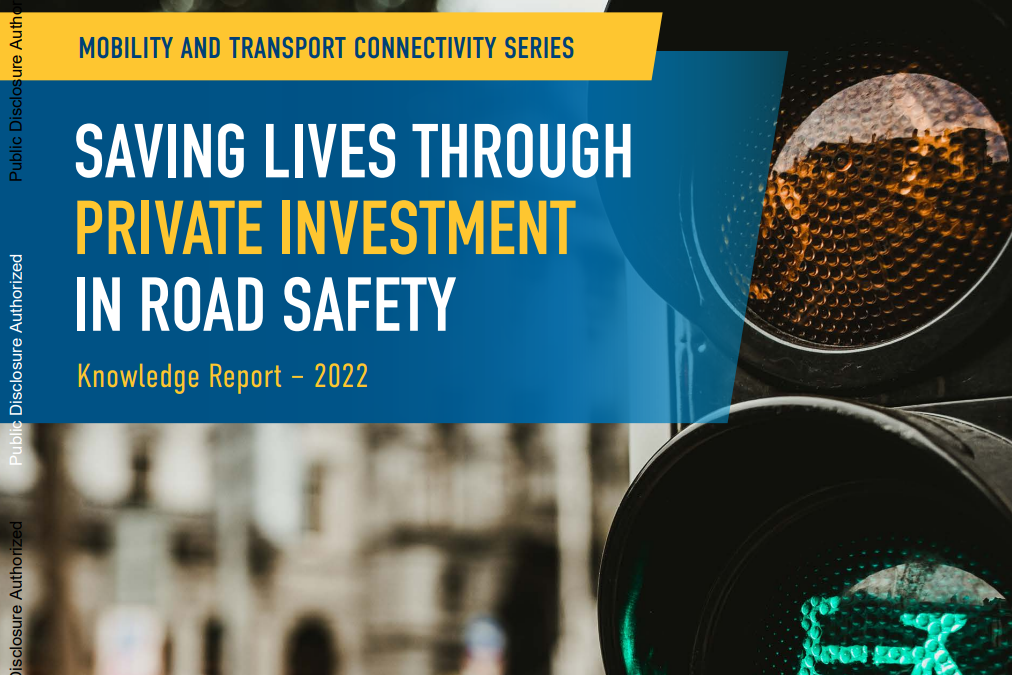Achieving safer roads and road use is possible. A realignment of incentives across safety outcomes and commercial interests is needed to mobilise and target the estimated $260 billion investment gap needed to halve road deaths and injuries by 2030. Innovative private sector financing and results-based impact investment holds the potential to unlock this win-win outcome to save lives, save money and create jobs worldwide.
The World Bank and International Finance Corporation (IFC), in partnership with the International Road Assessment Programme (iRAP) and FIA High Level Panel for Road Safety have released a report examining the market failure in road safety funding and outlining practical business models to mobilise the private investment and sustainable finance needed to address the invisible crisis of dangerous roads.
The Saving Lives Through Private Investment in Road Safety Report highlights road crashes as one of the leading causes of fatalities and serious injuries (FSIs) worldwide. Continuing with “business as usual” will see more than 375 million mostly young people killed and injured over the next decade resulting in economic losses of more than US$20 trillion by 2030. Road traffic crashes can cost countries as much as 6 percent of their GDP and trap families in poverty as they lose income generating potential and focus on providing lifetime care.
The report calls for a critical mobilization of private sector investment to address the gap and aligns with the recently launched Global Plan for the Decade of Action for Road Safety 2021-2030 to halve global road deaths and injuries by 2030. This includes investment focused on achieving Target 3 for all new roads to be 3-star or better for all road users and Target 4 to see more than 75% of travel in each country to be on roads that are 3-star or better for all.
The partners investigated business models and financing instruments to enable greater private investment in road safety. A team of consultants from Dalberg Advisors and Cardno were engaged to evaluate their viability and examine their potential in 10 countries across Latin America, Asia, and Africa. Operationalization opportunities and challenges were assessed in the countries, including through identification of potential pilot projects. In the second phase of work, Social Finance and Impact Strategist were engaged to bring an impact investment lens to the issue.
A series of solutions have been designed, including eight high-impact project archetypes, a framework for designing road safety projects, and five possible investment structures. Findings from more than 50 stakeholder interviews with road safety experts, public sector authorities, ecosystem actors, concessionaires, asset managers, and corporate social responsibility (CSR) funds and investors active across Latin America, sub-Saharan Africa, and South Asia informed the study.
iRAP Chair and FIA High Level Panel Secretary Miquel Nadal said, “The market’s failure to appropriately account for the costs of road traffic crashes is one of the prime reasons for public and private sector underinvestment in road safety. The growth of socially responsible investing and the sustainable finance market offers a new opportunity to address the failure and translate the economic case into an investable business case that delivers both lifesaving impact and a return on investment for private capital. Recognizing the costs and benefits of road safety can inform innovative mechanisms to create and align incentives for investment and unlock the win-win-win potential of 3-star or better roads worldwide.”
The Global Plan for the Decade of Action to 2030 calls on governments and partners to develop and implement national and local action plans to halve road deaths and injuries by 2030 and achieve the 12 Global Road Safety Performance Targets of which Targets 3 and 4 include ensuring all new roads are built to a 3-star or better standard for all road users (Target 3), and more than 75% of travel is on the equivalent of 3-star or better roads for all road users by 2030 (Target 4). “The World Bank leadership of this work, together with the established IFC and iRAP partnerships in Brazil demonstrate what is possible already. To ensure it is truly a Decade of Action and Delivery for Road Safety we need to rapidly scale the solutions that will save lives and private-sector financing is an essential part of that step-change needed to halve road deaths and injuries by 2030.” Rob McInerney, iRAP’s CEO said.
According to iRAP’s Vaccines for Roads Big Data Tool, achieving Targets 3 and 4 by 2030 stands to save 450,000 lives a year and 100 million deaths and injuries over the life of the treatments with an economic benefit of $8 of savings for every $1 invested.
The Saving Lives Through Private Investment in Road Safety Report is part of the World Bank’s Mobility and Transport Connectivity Series. The Series gathers evidence and promotes innovation and good practices relating to the development challenges addressed in transport operations and analytical and advisory services. The work builds on iRAP’s Social Impact Investment initiatives and the FIA Foundation’s “Investing to Save Lives” report.
Download the full World Bank report here.
Image source: World Bank Report


















